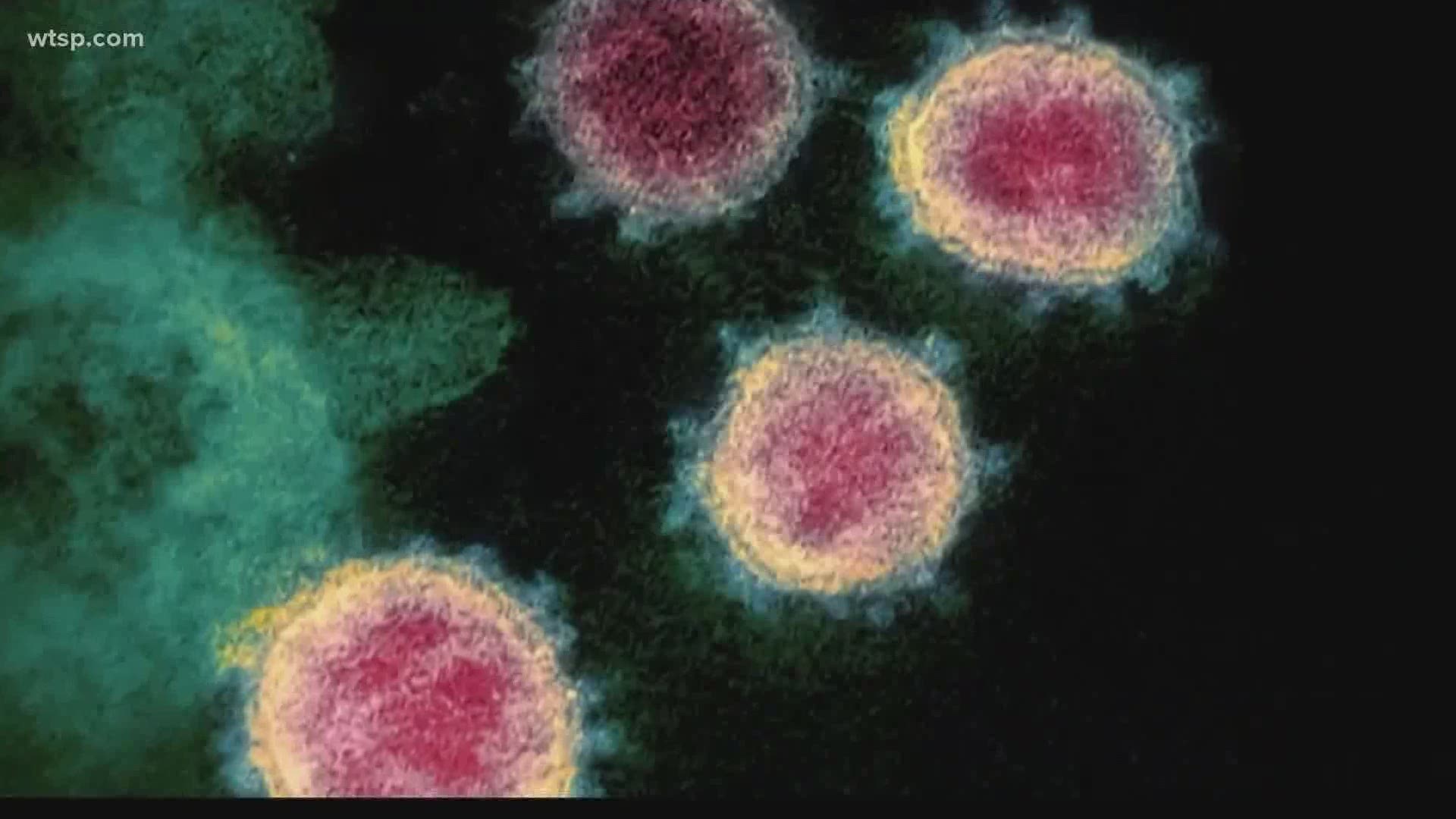TAMPA, Fla. — Florida is one of many states across the nation working toward a full reopening, but with coronavirus mutations already showing up in Europe and China, scientists may have to work quickly in finding new ways to test for the virus.
10 Tampa Bay reporter Emerald Morrow spoke with Dr. Jay Wolfson, distinguished service professor of public health and senior associate dean for health policy and practice at the University of South Florida’s Morsani College of Medicine. Here, Dr. Wolfson explains how mutations abroad could impact a potential second wave in the U.S.
NOTE: This conversation has been edited for length and clarity.
Reporter: If the United States sees a second wave of coronavirus in a mutated form, would people need to be tested again?
Dr. Wolfson: We're learning as we go with this virus and they call it a novel coronavirus for a reason because it's behaving like no other thing we've seen, including some of the SARS viruses.
It's not uncommon for viruses to mutate, it happens almost every year with the influenza virus. And we get ahead of it by understanding how we think it's going to change. So, between now and the fall, what we need to be able to do is predict how we think it's going to change, learn from China and Europe as it does mutate there and have another way by which we could test for it.
Reporter: Would the testing process change?
Dr. Wolfson: The testing process is going to remain the same. It's just that the devices, the chemicals that we use to test the blood, or the serum are going to be different. It's very important that we continue to do a couple of things. We must continue to test, test, test. As we've said, just because I get tested today and had a negative result, doesn't mean that I won't be positive tomorrow or the next day because it manifests in our bodies differently.
When we develop testing kits, we have certain reagents that are designed to bring out the virus, and we have to understand the specific strain of the virus that we're testing for so we can develop the proper reagent, which is a chemical. Basically that we test against the blood or the swab in the throat.
So, we have to be able to have samples of that mutated virus, or as we do with influenza, we can predict with statistical models what kind of mutation is going to take because we've had so much experience with it. But, with the coronavirus we have no experience with this. It's going to surprise us, and it's been pretty mean-spirited in how it's done that.
Once we get active, rapid testing kits, we will be testing a lot more. It'll be testing for both the virus that we know we have a strain for and as we watch what we learn from China and Europe, we can adapt and develop tests for what we think another strain might be.
Reporter: Where are scientists with monitoring new strains?
Dr. Wolfson: That's part of what the Institutes of Health are normally doing. But they're so overwhelmed with trying to develop a vaccine and trying to make sure we have enough test kits available now, that probably, a small portion of their time is being spent anticipating what a mutation might look like. This is why it's so very important that we cooperate and collaborate with those countries that are experiencing mutations.
Reporter: Does that put the United States behind?
Dr. Wolfson: We started off behind. We have to learn from our experience, and as you've heard me say, we simply cannot afford to be complacent. We're going to go through a period of maybe 45 or 80 or 90 days at most where there's going to be a lull for a bunch of reasons. And as a consequence of both the reduction of social distancing and what normally happens in the late summer/early fall with a virus like this, where it reemerges, we can expect to see another set of spikes and we must be prepared for that.
Reporter: Is Florida prepared?
Dr. Wolfson: We're doing better every day as we get more testing kits, as we train more people to get tested, as we work with community leaders and the churches and the synagogues and mosques and community political leaders to help educate people in our community to get tested because some people are reluctant. They are reluctant to come to a hospital if they're sick because they're afraid they may never come out again. So, getting people to get tested--and possibly doing so frequently if they, fortunately, do not test positive.
Reporter: Will testing become more routine?
We're going to have to get used to testing until we have a vaccine or a treatment and that requires education, vigilance, and we're doing better every day in Florida as we learn we have to test more and more, especially in the high-risk communities.
What other people are reading right now:
- Pinellas County beaches reaching 'unprecedented levels' of capacity
- Mother accused of murdering 9-year-old son
- Bradenton Police Officer dies unexpectedly after surgery complications
- Can hand sanitizer cause your car to catch fire?
- 'We're not closing our country' if second coronavirus wave hits, Trump says
- 53-year-old tortoise needs new home after owner dies of COVID-19
FREE 10NEWS APP:
►Stay In the Know! Sign up now for the Brightside Blend Newsletter



